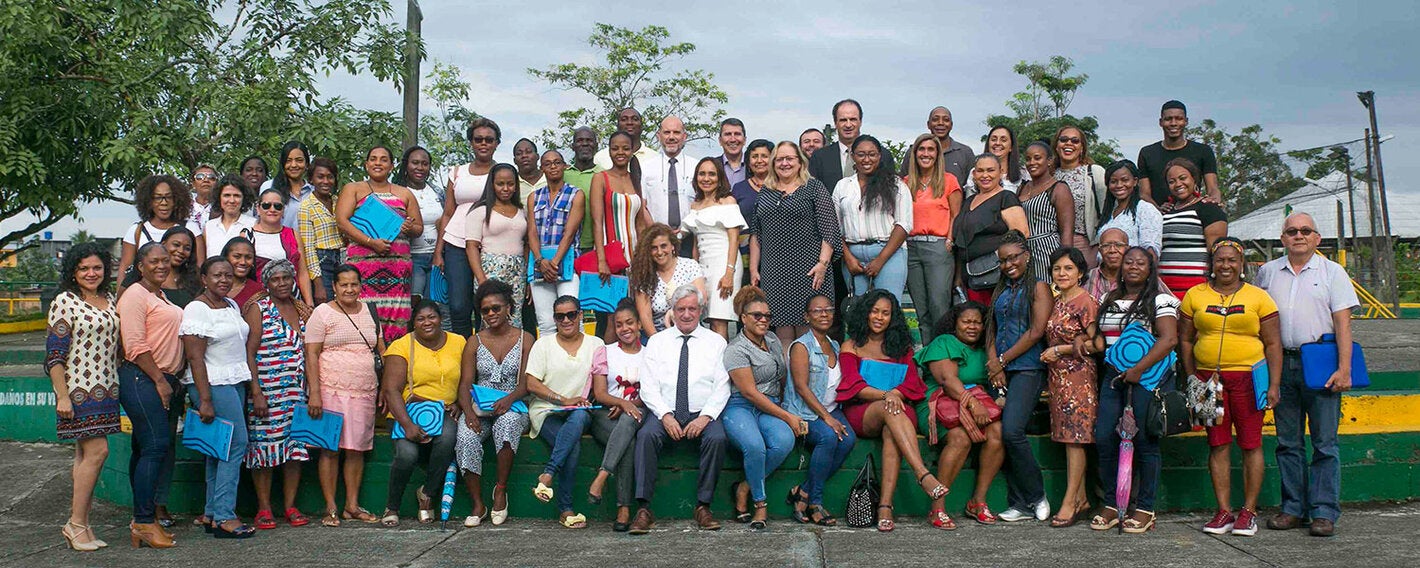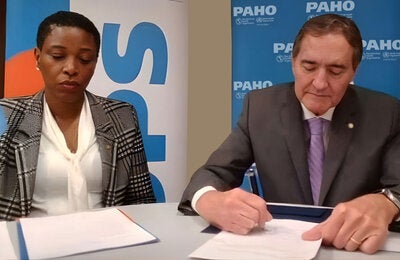
Quibdó, Colombia. 1 February 2019 (PAHO/WHO) - About 60 participants including nurses, midwives, community leaders and Chocó department physicians contributed to a meeting for project accountability, focusing on: "Increasing access and improving quality of care in maternal-neonatal health services in Chocó." The conference, held in Quibdó, the capital of the Chocó department in Colombia, marked the completion of the second phase of the two-year project carried out with funds from the Government of Canada.
During two days, those who attended the event discussed the successes, mistakes, difficulties and next steps of this proposal led by the Latin American Center for Perinatology, Women's Health and Reproductive Health (CLAP/SMR) of PAHO/WHO, together with the area of Family, Health Promotion and Life Course (FPL) of the PAHO/WHO country office in Colombia. One of the particularities of the project has been its interdepartmental approach within PAHO/WHO and its methodology, which has sought synergies with partners in the territory and efforts to involve the community, with the purpose of improving the health of mothers and newborns in one of the most unequal departments in the country, where indicators of maternal mortality ratio and neonatal mortality double the national average.
The peculiarities of the place
Chocó is a Colombian department with 90% Afro-descendants. The great dispersion of the population, the high rurality and the weak infrastructure of the department are some of the factors that explain the difficulty of access to health services for pregnant women, as well as a lack of timely response to their care.
It was in this context that two years ago the implementation of the project began in two phases, which addressed different angles of the problem. In this sense, Dr. Bremen de Mucio, CLAP's Maternal Health Advisor explained, "it was sought to strengthen health systems by improving the competencies of both obstetric emergency care and neonatal care, as well as improving quality of the clinical records with the perinatal clinical history SIP, the Perinatal Computer System." Analysis of death certificates and competencies for the epidemiological analysis of diseases was also carried out. On the other hand, in 2018 work began with the community, based on a diagnosis made in collaboration with citizens of the department to find out what their needs were and adjust the project to them.
According to Dr. Andrés De Francisco, director of the FPL department, "one of the most important points of this project is that it is not only doctors who come to promote health, but also the communities themselves. This approach is not only intended for Chocó, but for other departments, with the possibility of replicating it at the regional level."
Interprogrammatic work
In addition to CLAP, other areas of PAHO played an important role in designing the project, such as ethnicity, health services, intelligence, and PAHO/WHO Colombia. On the other hand, partners such as the international organization Enfant du Monde, the Colombian Federation of Obstetrics and Gynecology (FECOLSOG), the Research Group in Intensive Care and Obstetrics (GRICIO) and the Colombian Association of Neonatologists (ASCON), worked on developing different interventions of the project. Likewise, the Ministry of Health of Colombia, the Departmental Secretariat of Chocó, the Municipal Secretariat, health providers and the association of traditional birth attendants were all key actors in the development of the proposal.
At the meeting in Quibdó, Dr. Suzanne Serruya, Director of CLAP, addressed the 60 participants, "The project belongs to you, it belongs to the midwives, to the community leaders who live here and who will give continuity to the project. At CLAP, we believe that this is a model methodology, which we must learn from this experience," she said. The conference was also attended by Dr. Gina Tambini, Representative of PAHO Colombia, who pointed out that the most important element of the project is the local people, who have participated in the activities throughout the two phases. "If there was not that commitment to work together, we could not have any project,” said Dr. Tambini.
Among the Colombian authorities present at the Quibdó meeting were Carlos Murillo, Secretary of Departmental Health, Brinnay Córdoba, Secretary of Municipal Health of Quibdó, Jenifer García, Director of Departmental Public Health, Manuel Ruiz, Scientific Director of the Departmental Hospital of Chocó, and Víctor Hugo Álvarez y Ricardo Luque, from the Ministry of Health of Colombia, as well as the CLAP technical team and representatives from the PAHO/WHO Colombian country office.



